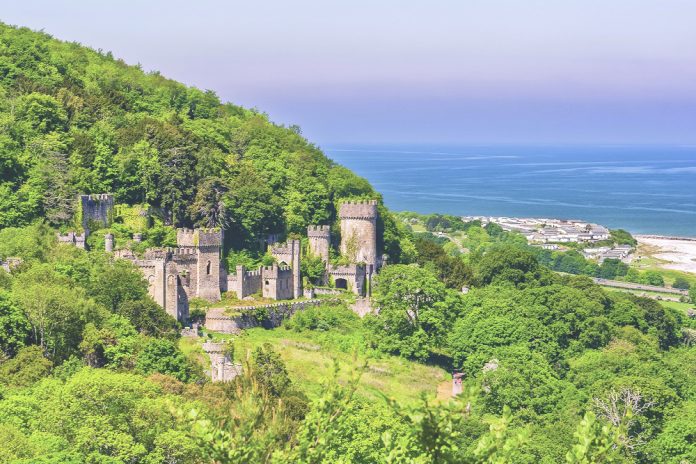
After 50 years of uncertainty and having fallen into a perilous state-of-disrepair, the future of one Gwrych Castle – the original home of Bnei Akiva, Bachad and over 200 Kindertransport refugees – is now secure.
At the age of 11, Dr Mark Baker set up the Gwrych Trust and 21 years later has been able to realise his dream of purchasing the site to restore it to its former glory.
The Grade I Iisted Gwrych Castle, Abergele in North Wales has been purchased after the UK government-funded National Heritage Memorial Fund (NHMF) stepped in with the final piece of the financial jigsaw. NHMF has given a grant of £600,000 in addition to a major grant from the Richard Broyd Charitable Trust, which has enabled the purchase to go ahead.
Gwrych Castle has a rich and diverse history, with direct links to the British royal family. It was built by Lloyd Hesketh Bamford-Hesketh between 1810 and 1822 incorporating his ancestral home. The castle was the largest newly built structure of the nineteenth century and was designed by several prominent architects including CA Busby, George Edmund Street and Thomas Rickman – major figures in the Gothic Revival movement.
It passed to Lloyd’s granddaughter, Winifred, Countess of Dundonald in 1894. When she died in 1924, she left the castle in her will to King George V and the then Prince of Wales (who later became King Edward VIII). It was the intention that Gwrych would become the family’s royal residence in Wales, however the gift was refused on the grounds of the economic downturn of the 1920s. The castle passed to the newly disestablished Church in Wales before being purchased in 1928 by the countess’s estranged husband, Douglas, 12th Earl of Dundonald.
During the Second World War, the castle housed 200 Jewish refugee children as part of Operation Kindertransport. Bnei Akiva and Bachad looked after these children under the guidance of Arieh Handler, in the first Hachsharah Farm in England. Children were taught the ideology of Torah v’Avodah, and given agricultural training to help them set up some of the early kibbutzim in the soon to be established State of Israel. The Castle was also home the Bnei Akiva’s first ever ‘kinus’ (gathering) in December 1940, and also hosted Arieh Handler’s wedding. It continues to play a role in modern day Bnei Akiva, with tiyulim and educational visits to the site a regular occurrence on Summer Machane (camp) over the years.
After the war the castle opened to the public as one of the first country houses in Britain to do so. It was used as a training venue for the English World Middleweight boxing champion Randolph Turpin in the early 1950s. During the 1970s, the castle was used as a medieval entertainment centre and was the first themed attraction of its kind in Britain.
The doors of the castle closed to the public in 1985 and it started to decline. It was bought in 1989 by an American businessman but sadly plans to renovate the building didn’t progress. The castle was extensively looted and vandalised, reduced to a derelict shell. It was used as the backdrop to the 1996 film Prince Valiant, starring Edward Fox, Joanna Lumley and Katherine Heigl.
Sir Peter Luff, Chair of NHMF, said: “Gwrych Castle is enchanting, even in its sadly reduced state. The vision of Gwyrch Castle Preservation Trust to restore this spectacular building with a rich history and to open it again is inspiring. All of us at the National Heritage Memorial Fund felt compelled to support their ambition.”
Mark Baker, Chair of Gwrych Castle Preservation Trust, said: “As a child, I would pass the castle everyday to and from school, and at the age of eleven founded the castle trust. Now twenty-one years later, we are in a position to purchase and realise that vision. A huge vote of thanks must go to the National Heritage Memorial Fund and the Richard Broyd Charitable Trust for believing in our vision.”
Joe Boxer, Mazkir of Bnei Akiva said: “we are incredibly proud and grateful that Dr Mark Baker has been able to purchase this valuable piece of our history. We are excited that the castle will be restored, and hope it can stand as a lasting symbol of the historic role Bnei Akiva and Bachad play in educating Jewish youth – a role we continue to excel at almost eighty years on.”
The castle and grounds are currently open daily for visitors but sections of the main building are closed due to its derelict state. The Gwrych Castle Preservation Trust will now set out plans to renovate the castle and the 250 acres of park and woodland. It is hoped to open the main building eventually to visitors as part of a full restoration programme.









